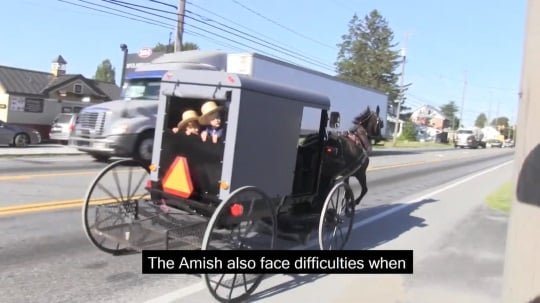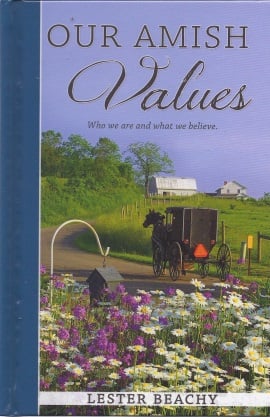Amish Heritage Foundation Challenging Wisconsin v. Yoder
From the article in Mennonite World Review:
Though the U.S. Supreme Court’s Wisconsin v. Yoder decision has traditionally been hailed as a religious freedom victory for the Amish, some Amish people want to challenge the 1972 ruling. That’s one thing the founders of the Amish Heritage Foundation, a new organization with a goal “to reclaim our Amish narrative,” will discuss at their first conference.
…
The Supreme Court ruled in favor of the Amish, exempting them from compulsory education past the eighth grade.
“It’s identified as a religious freedom victory,” said Elam Zook, director for the development of Amish literature of AHF. “But for Amish children, it was fundamentally the absolute and complete opposite. . . . It was actually a betrayal of the core tenet of Anabaptism, which was adult baptism, which was about making a decision to become a member of the sacred community.”
Zook identifies as a “noncompliant Amish” person, like someone who identifies as culturally Jewish but does not practice the faith.
“We are not in compliance with church ordnung [rules], but we can’t erase our identity,” he said. “It’s always going to be there no matter what we do or where we go.”
…
Zook believes that given enough time, the Old Order Amish would have eventually become somewhat more culturally assimilated. But once the Wisconsin v. Yoder ruling limited government oversight of Amish children’s education, he said, the Amish “essentially became completely detached from any engagement [in society].”
In the program for the conference, Zook’s core argument is stated: “[Wisconsin v. Yoder] directly created an embrace of ignorance and a poverty of literature among our Amish people, and in the process, ran roughshod over our legal rights as Amish children and adults. Wisconsin v. Yoder is responsible for freezing us Old Order Amish in time; we have stopped evolving from this point forward.”
Two other Amish-raised individuals comment in the article. Torah Bontrager:
Bontrager said the Amish are taught that their forebears died for an interpretation of religion that cannot be questioned.
“If I were to question or challenge that, that’s equal to spitting in the face of what our forefathers died for,” she said. “. . . We’re not allowed to look at our forefathers for inspiration before they attained their religious freedom. We’re not allowed to rebel like they did.”
Margaret Schwartz:
Schwartz said lack of education among the Amish was indeed a concern.
“I can see both sides,” she said. “I can see parents having a concern for their children’s education, because there are unbiblical things being taught [in public schools].”
She chose to home-school her children and complied with the relevant laws in her state. But she saw some Amish families pulling their children out of school at sixth grade, saying they would home-school them but then not give them a comparable education at home.
“I always enjoyed learning, and I wanted to go on to school,” she said. “Today, I would have been a doctor. Because I was an Amish girl, that opportunity was denied.”
Schwartz said not every Amish community is the same, and some are becoming more open to education. But she knew of some abuses that gave her concern.
The inaugural conference is themed “Disrupting History: Reclaiming Our Amish Story” and will take place September 28-29 at Franklin & Marshall College in Lancaster, PA.







Wisconsin v. Yoder a Betrayal?
The Amish Heritage Foundation lays out a hefty task in proving that Wisconsin v. Yoder betrayed the academic future of the Amish. It left a choice, granted, that is not given to those with other religious beliefs. But nothing in W v. Y asserts that the Amish cannot attend school past 8th grade. As one example I think of Joe Wittmer, raised Amish and left before joining the church. He earned his doctorate, turned, and spent the majority of his life as a champion of the Amish. And I think of the struggle in mainstream America now as those with a college education look for employment in their chosen field, and the meaning and purpose of the entire educational system is in turmoil. I applaud small groups that question the large majority. They are needed, always. But in this case the Amish spoke, and continue to speak to their own choice in overwhelming numbers. If you challenge that, challenge with a focus, precision, and thoughtfulness to your words.
Wisconsin v. Yoder a Betrayal?
Thank you very much for your response, Jim. Having read your book, I greatly respect your perspective. I am afraid Elam Zook’s argument is that of a disaffected former Amish person. He has the choice to go back to the Amish way of life if that is what he desires. He can continue in the lifestyle he has now but somehow he has to get over the “former Amish” thinking and get on with his life, finding contentment in today.
To identify as Amish or Mennonite is to identify with a religious community, with all that goes along with that. My older brother could, to use Elam’s term, identify as a ‘non-compliant Mennonite” since he was raised the same way I was but chose not to follow in this path. There are certain parts of the culture he was raised in that stay with him 56 years later, but that does not make him a Mennonite nor does he claim to be one.
We have often asked the question about Amish and Mennonites; is this first a matter of faith or of culture. I will argue that faith is first and that culture follows. In terms of the Wisconsin v Yoder case, the parents have the Biblically mandated responsibility for their children from birth to the age of accountability (whatever that is). That includes choosing the means and level of education. If the child, upon reaching the age of accountability chooses to seek further education while recognizing where that puts him/her in relation to the church, he/she is free to do so.
All people are a product of the culture in which they were raised and there will always be a remnant of that culture stay with them regardless of what other choices they.
You put this very well Osiah. I agree with you.
Well said!!!
Education
Why don’t the communities have a school of their own like the Baptist do? Would the Amish be allowed to join a Bible college? Aren’t their educational goals set by the communities and enforced for home schooling? I am sure that there would be a way to combine religion and culture within the bounderies of the Amish culture..
Betrayal?
I don’t quite understand why these ex-Amish think Wisconsin v. Yoder et al. is a betrayal of the Amish academic futures. The law that was in question at the time of the landmark case was about compulsory school attendance. In my law classes, our professor discussed the case (it was in the textbook, and we were just east of the Elkhart/Lagrange community) stating that the law was intended to ensure the youth of America would leave school as productive members of society, not as future wards of the state. Part of the response given by the Supreme Court Justices noted that the Amish faith prepared their youth for productivity and being a part of the larger workforce. In other words, the professor said, the Amish were fulfilling the purpose of the compulsory attendance law in their own way before the law was even enacted. Adding this to the danger of Amish youth leaving the faith after exposure to higher education, the court ruled in favor of the Amish and Mennonites involved in the case.
Some of the Hutterites have currently developed a course of study with Canadian universities to educate their young people and provide them with teaching degrees that are to be used in the colony schools. Perhaps that would be path the Amish in question could take. Getting a “religious freedom victory” overturned and asking the government to be involved in church run education could easily come back to haunt you.
follow up
Hopefully this site can do a follow regarding the outcome of the meeting.
“Disrupting History: Reclaiming Our Amish Story”, or, point to where to find information on the web regarding the meeting’s outcome.
Compulsory Education
Societies dating back to biblical times have recognized the value of an educated populace versus an ignorant one. It is difficult to find good employment (with benefits) in America without at least a high school diploma. When you are an Anabaptist with only an 8th grade (at best) education, your employment choices are very small. You must be self employed or remain within the clan to make a living. I am unsure if the state of Wisconsin oversees any type of educational standards for the Anabaptist schools like they do for other students. I have patiently stood by many times while Amish gentlemen try to calculate a simple bill and add the sales taxes. It is frustrating. Some of the signs I see on Amish farms have poor spelling and improper syntax. Discussions of history, civics and government and many other topics are difficult or impossible. The phrase “ignorance is bliss” comes to mind; but in the U.S. we are free to choose the level that we educate the next generation if we choose to “opt out”.
Utterly false. Millions of foreigners with no English language skills at all, and less than a high school education, have come to the United States for job opportunities. It is one of the best countries in the world for persons with low educational attainment to make a living.
I agree with Roger. Look at all the wealthy Amish business owners & prosperous looking homes in Holmes County, Ohio!
Compulsory Education
You are correct. ‘Millions of foreigners with no English language skills at all, and less than a high school education’ They are called illegal aliens: 15 million or more. Many on welfare. Most don’t speak English and perform menial labor. Our area hosts a lot of them who are exploited working on large dairy farms. But that is an entirely different problem.
My point is that a nation and society benefits when all it’s citizens have a basic level of education. All children should be given the opportunity to learn and make individual life choices. Even Anabaptist’s.